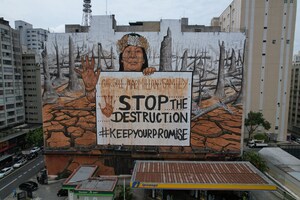New Stand.earth data: Royal Bank of Canada fossil fuel finance exceeds $9.2 billion since COP26
TORONTO, Nov. 4, 2022 /PRNewswire/ -- Ahead COP27, Stand.earth released new data revealing Royal Bank of Canada financed more than $9.2 billion in fossil fuel companies since joining GFANZ last October, and over $7 billion in the first three quarters of 2022. This includes more than $16 billion in extreme fossil fuels such as tar sands, fracking, and coal on behalf of its clents.
The data, sourced from Bloomberg and Refinitive terminals, compiled by Profundo for Stand.earth, analyzes RBC's loans and underwriting to fossil fuel expansionists. This includes deals with companies like TC Energy, ExxonMobil, Chevron, and Saudi Aramco. RBC is on-track to exceed 2021 fossil financing, despite commitments to help Canada achieve its climate goals.
"While floods, fires, deadly heat and pollution endanger the lives and livelihoods of communities across Canada and around the world, the Royal Bank of Canada continues to bankroll the fuel for the fire," said Sarah Beuhler, Stand.earth Climate Finance Strategist.
Stand.earth will submit the data to the Net-Zero Banking Alliance (NZBA) Steering Committee and UN Secretariat, formally requesting review of RBC's membership. Stand.earth also will submit this to Canada's Competition Bureau, which is currently investigating RBC for alleged misrepresentations of its climate claims
RBC joined the Glasgow Financial Alliance for Net-Zero (GFANZ) in October 2021, promising to align the bank's lending and investment portfolios with a science-based pathway to net zero by 2050. RBC and Canadian banks risk getting booted from the global network as they push back against the global financial sector setting standards for climate risk.
RBC is Canada's #1 fossil bank and the fifth worst funder of fossil fuels in the world, financing coal, tar sands, oil and gas to the tune of CAD $262 billion since the Paris Climate Agreement was signed in 2016.
"RBC claims it might need to increase fossil fuel finance to reach net-zero. No one expects the switch to be flipped overnight, but to not have a fossil fuel phase-out plan is blasphemous in 2022," Beuhler added. "Following the release of its latest shameful net-zero commitments, it's clear the bank is dangerously disconnected from economic, scientific, and climate justice reality, and misstepping among even the worst actors of the global financial sector."
As RBC greenwashes its climate commitments and touts Indigenous reconciliation rhetoric, the bank is financing toxic fossil fuel expansion projects around the world that our climate cannot afford, carbon bombs set to trigger catastrophic climate breakdown.
This comes as regulators around the world hold financial institutions accountable for greenwashing, including the UK's advertising watchdog banning HSBC's advertisements for misleading climate claims.
Indigenous land defenders face drilling of the Coastal GasLink pipeline (CGL) under Wedzin Kwa. The project violates Wet'suwet'en rights and title, of Wet'suwet'en Hereditary Chiefs. Royal Bank of Canada is CGL's primary financial advisor.
"RBC has the opportunity to truly live up to its shiny reputation of corporate purpose, Indigenous reconciliation and meaningful climate action," Beuhler added. "That means stopping funding the expansion of fossil fuels, and reinvesting in a climate-safe economy and just transition for oil and gas workers and communities."
SOURCE Stand.earth

WANT YOUR COMPANY'S NEWS FEATURED ON PRNEWSWIRE.COM?
Newsrooms &
Influencers
Digital Media
Outlets
Journalists
Opted In


Share this article